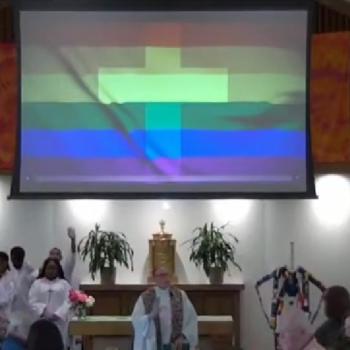Progressives within the Catholic Church currently feel a certain degree of buyer’s remorse concerning the recently ended Synod on Synodality (SoS). All the hope reflected in the initial “listening sessions” that the Church change her views on women’s ordination and human sexuality evaporated with the release of the Final Document on October 29th, 2024. This document makes no mention of adjusting the Church’s view on sexual ethics and offers only a slim hope by stating women’s participation in the diaconate “remains open.” (However, Pope Francis responded to a journalist with a “no” when asked about women deacons in a recent interview). In short, nothing changed.
Why do I bring this up? Well, a recent article in America by Mary McAuliffe titled, Women and LGBTQ Catholics are paying the price for church unity, left me wanting an honest dialogue regarding how the Church ought to change.
Are Women and LGBTQ Catholics Paying the Price?
In Mary McAuliffe’s article, she lays out the price women and LGBTQ Catholics currently pay for the Church to maintain her unity. Furthermore, since the article exists behind a paywall, I do quote her at length below.
At the outset of the article, she states:
Like many who are hopeful for visible improvement to the status of women and L.G.B.T.Q. people in the Catholic Church, I have seen the Synod on Synodality as a mixed bag of anticipation, disappointment and a diligent search for God’s grace at work. I have nurtured a cautious optimism that my church might be ready to make more room for L.G.B.T.Q. Catholics to be their authentic selves, and to more fully honor women’s baptismal dignity by restoring the female diaconate. It is clear now that prayerfully embarking on this synodal journey with my church will often mean setting aside my desires for immediate large-scale change. [emphasis added]
So, according to Mary, the SoS got her hopes up and eventually squashed them. Why? It promised to “listen” to her and gave the impression through the listening sessions that “large-scale change” appeared underway in “her” Church.
The Hoped for Large-Scale Changes
Moreover, Mary goes on to identify the needed “large-scale changes” she hoped the SoS would address. She states:
Whatever other doors the synod opens, women will still be asked to be a part of, and to minister in, a church which maintains that God does not see fit for us to image Christ on the altar. L.G.B.T.Q. Catholics will still be asked to be a part of, and to minister in, a church that refers a part of their capacity for love as “intrinsically disordered.” Having to continually ask, “What does my church believe about me?” and “Does it really believe that I am made in the image of God?” is a cross almost unique to women and to L.G.B.T.Q. Catholics. [emphasis added]
Women’s Ordination
Clearly, Mary hoped the Church, through the SoS, would affirm women serving at the altar. That she used the phrase “image Christ on the altar” seems to go beyond the desired role of deaconess, as this phrase more aligns with the role of the priest as in persona Christi. Why not state this intention from the start?
If Mary wishes for the Church to change her views on women’s ordination to include the priesthood, why not come out and state this? To not state this intention at the start makes the diaconate appear merely as a steppingstone to something greater.
Sexual Ethics
Furthermore, her calling out the Church’s language when referring to homosexual activity as “intrinsically disordered” demonstrates her desire for the Church to change concerning same-sex sexual ethics. However, she does not offer any suggestions as to how the Church ought to change. Mary comes close in her criticism of the Church’s language used concerning homosexual activity. According to Mary, the Church denies “love” and a homosexual person’s value as “made in the image of God” if she denies their preferred expression of homosexual “love.”
So, the Church ought to change her view on sexual ethics, especially regarding homosexuality. If Mary (and those like her) wished for the Church to change her views on homosexuality, why not state this at the start?
Why the Church Must Change
At the end of her article, Mary makes the following emotional appeal for change:
If we are to be a synodal church, are all of us ready to hear and honestly reckon with the sacrifice being asked of women and L.G.B.T.Q. Catholics? Can our church even acknowledge the sacrifice it is asking of us? Can our parishes take our pain seriously without patronizingly trying to “re-catechize” us about what the church actually teaches, or pointing to the other roles available to us as though they should put an end to that pain?
And:
I also pray that synodality may be the path by which my church learns to fully love both me and my L.G.B.T.Q. brothers and sisters, and that God grants me a long enough life to see that love realized.
According to Mary, the Church must change because the needed change does two things: 1) acknowledges the pain experienced by women and L.G.B.T.Q Catholics; and 2) actualizes the fullness of love for women and L.G.B.T.Q Catholics. Conversely, failure to change on these issues means that the Church does not love, and wishes continued suffering, on women and L.G.B.T.Q Catholics. Furthermore, any attempt at correction (or “re-catechizing”) by the Church will come across as patronizing.
Therefore, to be “synodal,” the Church has only two options: change and demonstrate love or refuse to change and contribute to the continued suffering of women and L.G.B.T.Q Catholics. Oh, and if the Church tries any form of correction, the Church adds even more insult to injury.
“Acceptable Answers”
In her article, Mary asks two very important questions.
“What does my church believe about me?” and “Does it really believe that I am made in the image of God?”
She also states that asking such questions represents a kind of “cross” for women and L.G.B.T.Q Catholics. Why? Well, it appears these “crosses” reflect unsatisfactory answers to these questions by some women and L.G.B.T.Q Catholics. If the answer to the first question does not affirm women’s ordination and same-sex sexual relationships, the Church believes women inferior to men and denies the humanity of L.G.B.T.Q Catholics. Moreover, if a “yes” answer to the second question does not also include an acceptance of women’s ordination and that God created someone L.G.B.T.Q, the Church answer is really a “no.”
In short, to Mary and Catholics like her, the Church must answer Mary’s questions in Mary’s way or further cause her pain and suffering.
Final Thoughts…
In closing, I offer my final thoughts to Mary McAuliffe and those Catholics who think like her. Mary, to answer your first question, the Church believes that you need Jesus, and Jesus asks all His followers to take up their crosses and follow Him (Matthew 16:24-26). To Jesus, this means those who follow Him must deny themselves and lose their life, or in other words, to not get their own way. You seem to want your own way, which is not the way of the cross. Furthermore, in answer to your second question, yes, the Church believes you were made in the image of God. However, as an image bearer, you do not get to call the shots or demand the Church change according to your own image.
Finally, I have one last question for you and Catholics who think like you. Do you consider the Catholic Church divine or human in origin?
How you (and others) answer this question will determine if the Church possesses the ability to change in accordance with your demands. If the Church is of divine origin, she cannot change as you wish her to. However, if she is of human origin, she can and will change just as all other human institutions do.
Thank you!
Read The Latin Right’s other writing here.
Please visit my Facebook page and IM your questions (and follow my page) or topics for articles you would like covered.
Also, please subscribe my YouTube page for updates on upcoming articles.














